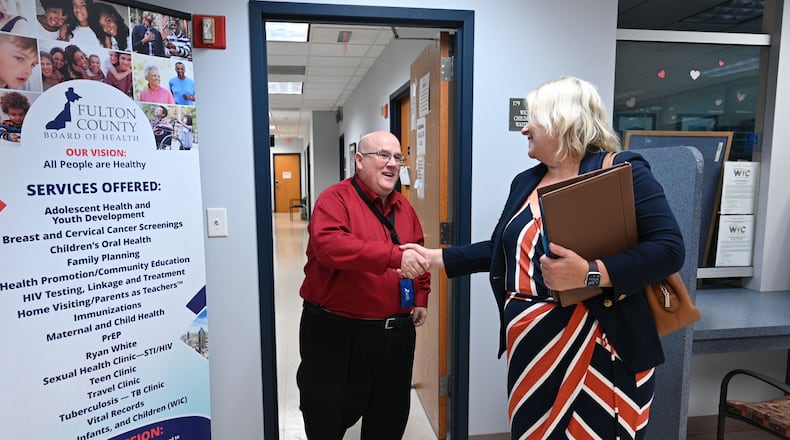If you are a single mother without a job, you don’t pass up a chance to get in front of people hiring anywhere close to your field, so Amy McEver was there.
After decades working for and running science-related publications, McEver interviewed with recruiters Tuesday at a Fulton County Board of Health Career Fair, ready to broaden her horizons, if that’s what it takes.
“I’m looking at advertising, marketing, communications,” she said. “Why not a career change at 53?”
Still, the Marietta resident worries that a hiring exec might see her age and draw the wrong conclusions. “We are very tech savvy,” she said. “And I don’t care what they say about Gen-X — we are loyal as hell.”
She enters the labor market at a fraught moment.
The labor market see-saw generally tilts to the advantage of employers. Companies typically ride high, setting the terms for pay, benefits and work conditions — knowing that if a jobseeker objects, there’s nearly always someone just as qualified who is ready to take it.
The recovery from the pandemic changed all that, leaving workers sitting pretty.
As this Labor Day approaches, the market remains worker-friendly and joblessness is still historically low. But balance has been slowly drifting back toward the norm that prevailed before COVID-19.
“We are still experiencing the effects of the pandemic,” said Daniel Altman, chief economist for Instawork, which connects millions of workers to temporary jobs. “That is the most important thing that is driving the economy still.”
The unemployment rate for both Georgia and metro Atlanta stood at 3.2% in July, slightly above its all-time low. Layoffs have ticked up in recent months, as have the number of job seekers. Despite efforts by the Federal Reserve to tame inflation, Georgia continues to be a beneficiary of major jobs announcements and investments, particularly in the electric vehicles and green energy sectors.
‘A more normal situation’
After massive layoffs in the early weeks of the pandemic, the economy rebounded, fueled partly by huge federal spending.
At first, with millions of consumers stuck at home, spending on goods was dramatically higher than usual. Over time, spending has been gradually shifting back to services, travel and entertainment.
Those swings made for vastly different hiring needs.
And with demand strong, many employers struggled to find the workers they needed. They raised wages, gave many workers permission to work remotely and offered more flexible hours. The shortages were worst — and the enticements to workers most robust — in health care and hospitality.
Job openings soared, and so did the willingness of workers to quit jobs they didn’t care for.
As the pandemic changes fade, the mix of spending as well as the kinds of the workers in demand is looking more like it used to, Altman said.
“All of this leave us positioned for much more normal consumer spending the rest of the year,” Altman said. “Things are returning to a more normal situation and we should see that in the labor market and the economy as a whole.”
Some of that rebalancing is intentional. For nearly two years, the Fed has been lifting short-term interest rates. By raising the cost of borrowing, the Fed has dampened spending by consumers and business alike.
And while the Fed hasn’t flipped the economy into a downturn, higher rates are having an impact on hiring. Several indicators signal the shift back toward “normal,” albeit with a lingering advantage for workers in many sectors.
The number of job openings has dropped. So has the rate of people quitting jobs, both nationally and in metro Atlanta, according to economist Loujaina Wahed at New York-based Revelio Labs, which analyzes employment data.
While unemployment is still historically low, it has edged higher. Unemployment claims are muted, but they’ve have inched up from a weekly average of 4,666 Georgians in April to more than 6,625 the past four weeks.
The number of unemployed persons — out of work and actively searching for a job — is about the same as just before the pandemic, but it has climbed since April.
The number of job openings in Georgia has been sliding since May, said Wahed. Openings are still higher than they were pre-pandemic, but in July were 12% lower than a year earlier, she said.
“It is still a tight labor market in many sectors, but we have started to see signs that the market has shifted,” said Joanie Bily, chief experience officer at EmployBridge, an Atlanta-based staffing firm. “Over the past six months, our customers have slowed down on hiring, but there’s still demand, especially for skilled workers. There are still tremendous opportunities, but I think there’s just some more balance.”
Fewer work from anywhere jobs
Among signs of a transformation is a declining willingness by employers to permit workers to do their jobs far from the office, whether at home or in distant cities. Pre-pandemic, remote jobs averaged just 4% of total job postings in Atlanta, according to JLL, a real estate company that closely tracks growth.
By last fall, 14.6% of jobs were officially remote, JLL said, but has ticked down since.
There has also been a slackening of demand in some sectors, especially smaller ones with less consumer fuel.
Those factors have dampened the job search for some.
Credit: HYOSUB SHIN / AJC
Credit: HYOSUB SHIN / AJC
McEver, the Marietta mom at Tuesday’s career fair, said she had been working as a contractor at the Centers for Disease Control and Prevention. But that job ended along with federal funding in mid-August. She started her job search several months ago and has sent out hundreds of resumés.
“You hear the economy is good, but I haven’t had much luck,” she said.
McEver wants to stay in Marietta, where her son is a high school senior, so she is frustrated at the shortage of work-from-wherever job options.
“I’m in sort of in a special market, but I just didn’t think I’d have this much trouble,” McEver said.
Signs of a tight, but decelerating job market
Job openings (U.S.)
Pre-pandemic: 6.995 million
Recent: 8.827 million (July)
January: 10.563 million
July 2022: 11.380 million
Unemployment (Georgia)
Pre-pandemic: 187,983 (Feb. 2020)
Recent: 169,834 (July)
January: 161,710
July 2022: 158,112
Average weekly earnings gains, annual rate (Atlanta)
Pre-pandemic: 1.5% (Feb. 2020)
Recent: 2.5% (July)
January: 3.7%
July 2022: 6.1%
Remote job postings as share of total (Atlanta)
Pre-pandemic: 4%
Recent: 12.2% (July)
July 2022: 13.4%
*Unemployment is the number of people without jobs who are actively searching for work.
Sources: Revelio Labs, JLL, Bureau of Labor Statistics, Georgia Department of Labor, Federal Reserve Bank of St. Louis
About the Author
The Latest
Featured




